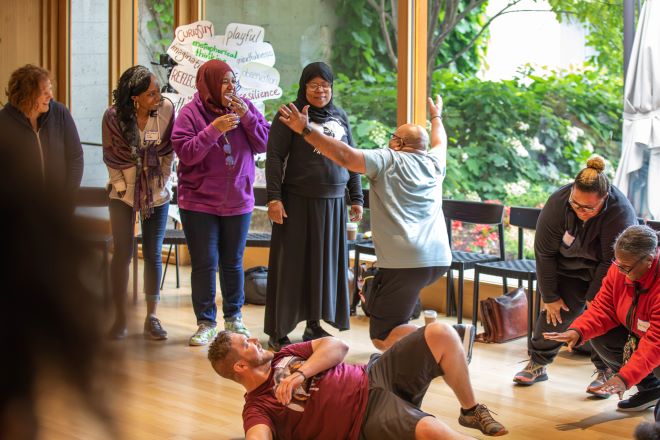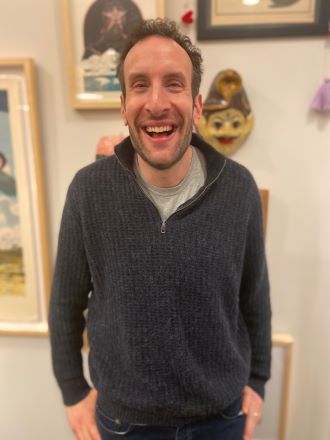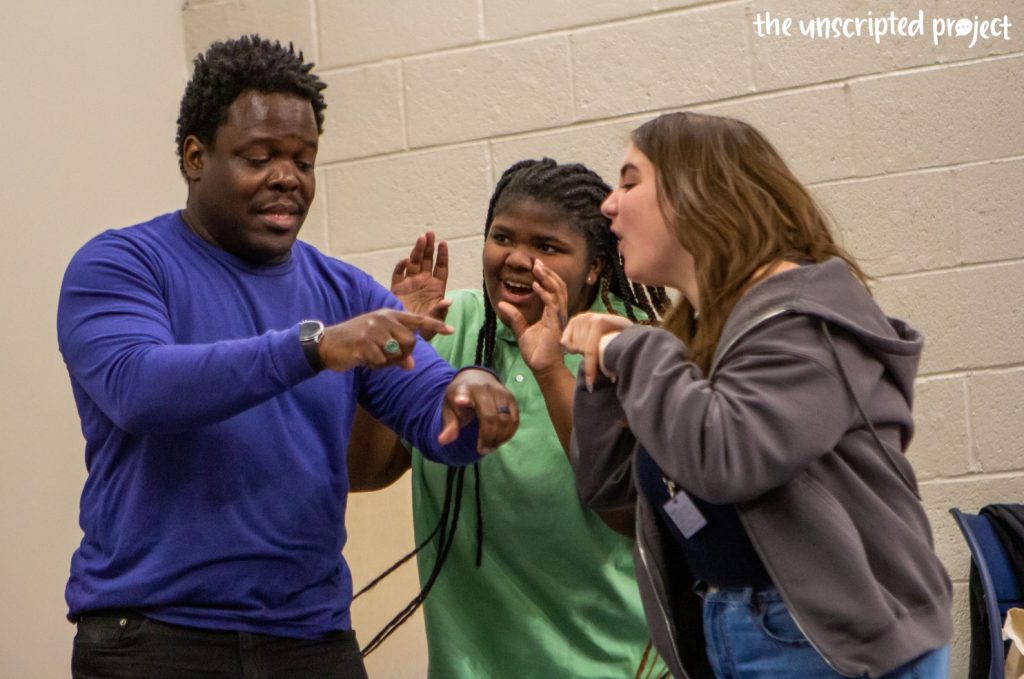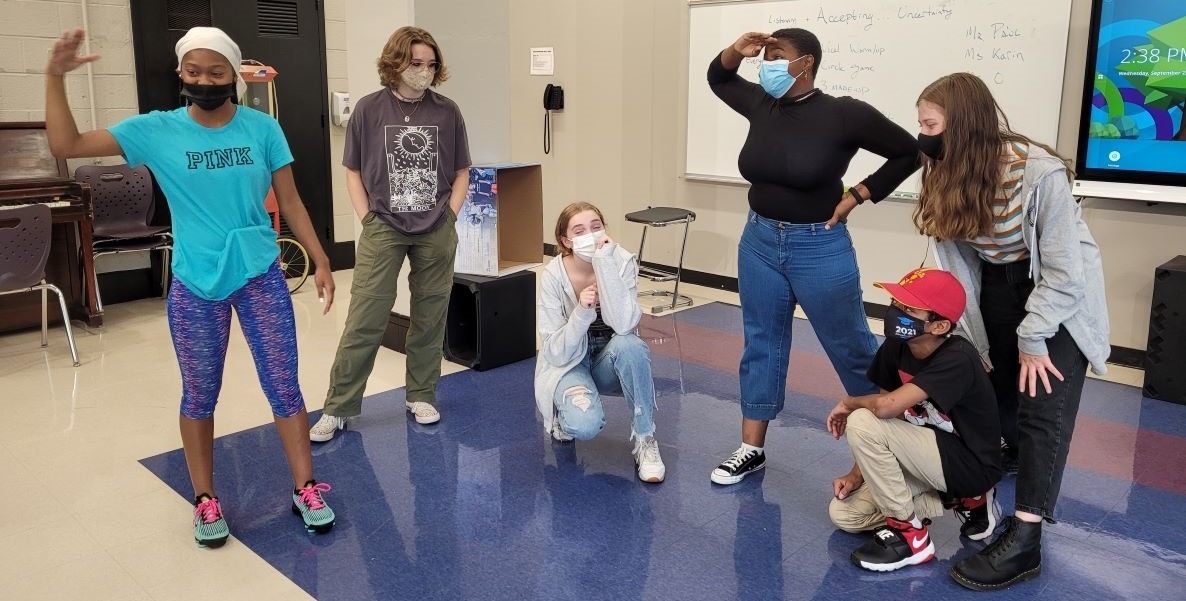I discovered improv in the midst of a painful breakup, in 2014. Each week, I’d take my sorrowful self to class at the Adrienne Theater on Sansom Street for two hours of guaranteed laughter. In my ComedySportz classes, I embodied different characters, played nonsensical games, learned to mime (badly), to speak gibberish (also badly), and to engage in atrocious, off-rhythm raps. What started as a way to escape pain became a mechanism for self-expression and empowerment.
Unlike in an improv show, in which performers engage in make-believe on stage, in front of a paying audience, improv classes are much lower stakes, and emphasize skills that might be used (eventually) in performances, for fun, or for a host of reasons – from learning to be better public speakers to having something social to do, to talking with each other about difficult subjects.
As Bobbi Block, director of Applied Improv Programs for ComedySportz, notes, “We’re not teaching you how to improvise. We’re teaching you the skills that improvisers use: Being present, letting go of your agenda, building trust, collaboration, releasing perfectionism and embracing recovery over perfectionism, and how to bounce back and be resilient after something disrupts or changes.”
“I want to give a shout-out to play. Play is universal. When you play with each other, a lot of barriers break down.” — Bobbi Block
What I didn’t know when I signed up for ComedySportz was how vibrant, and diverse, Philly’s improv scene is — and how much it has become a resource for populations as varied as corporate executives, environmental activists and those just looking for community. The skills honed in improv are helping neurodivergent people express themselves and Philly teens to gain self-confidence; it has provided a way for climate activists to talk to skeptics, and underserved youth to find community with each other. And it all happens through a lens of humor and play.
“Improv is a very powerful means to life-skills and community building,” says Meera Menon, co-founder of The Unscripted Project, which uses improv to equip middle and high school students with the skills for future life success. “If you can build formative skills — like self-confidence and being able to become more comfortable with mistakes, or not second guess yourself — and connect improv skills to real-world things, like interviewing, group projects, and so on and so forth, that actually pays dividends far, far down the line.”

For those on the autism spectrum
Much like myself, Adam Taupin found improv in the midst of a breakup. Unlike myself, he was in grad school, training to be a therapist, when he started taking classes at Philly Improv Theater (PHIT). In the decade since, he’s combined his passion for mental and emotional wellness with his love of improvisation. He teaches improv to neurodivergent folks, as well as to other improv instructors looking to work with those on the autism spectrum. He even wrote his dissertation about the use of humor among people on the autism spectrum, as a way to build social skills.
“There was some thought that people on the spectrum don’t understand sarcasm or are humorless,” Taupin says. “So there wasn’t much in the literature on the opposite, and my work was, at least in part, debunking that kind of thinking.”

There’s more literature now, although the research has been slow. But there’s no denying anecdotal evidence. After the last workshop he taught, a student approached Taupin to tell him that improv gave him permission to express themselves, in and out of class. “For him, it was like, all of a sudden he could be quirky. And it was almost like a superpower, embracing that,” Taupin says. “Oh, everything can be improv now. And I can be a quirky character,’ which is more just an expression of self.”
Taupin encourages his students to practice being themselves, in heightened ways, to experiment with trying new things, and to embrace their mistakes — necessary coping skills for anyone who experiences social hypervigilance, ostracization or anxiety. “It can be tricky, if you don’t have any sense of social mastery, to take on the world,” Taupin says. “But, if you can have a sense of when you know laughter is coming, or you’re even developing self-deprecating humor that you initiated, then it doesn’t have to feel like you’re being laughed at, but that people are laughing along with you. What a transformative experience.”
A valuable tool for everyone
Just before the world shut down and a global pandemic drove us all into isolation, Menon and Philip Chen launched The Unscripted Project, which, over the last year, brought improv to 14 schools and 36 classrooms in Philadelphia. They served 966 students, approximately 90 percent of whom are BIPOC.
Once a week, for 10 weeks, Unscripted’s teaching artists enter public school classrooms, push the desks aside, and invite students to play together. They engage the students in imaginative exercises, then have conversations about how the skills required in the exercises and games translate into their lives. The goal is to improve the middle and high schoolers’ emotional intelligence, increase their empathy, and help them experience greater self and social mastery.
In a post-program study, 79 percent of students reported feeling like they were better able to understand their own emotions and the emotions of others, 80 percent felt like they’d become better communicators, and 81 percent reported feeling more comfortable socializing with their peers.
“We all love improv, but we use it in the service of the skills. That’s why the reflection and the discussion are key,” Menon said, “I think improv is actually a tool that is valuable for everyone.”
Latanya Morgan, one of The Unscripted Project’s teaching artists, is the Founder/Executive Director of the Sawubona Creativity Project, a nonprofit theater arts initiative and space that weaves social-emotional learning (SEL) and character education (CE) components into improv and theater arts curriculums for people of all ages. When she started, Morgan says, she was “always the only Black person and the only Black woman. Always.”
“We all love improv, but we use it in the service of the skills. “I think improv is actually a tool that is valuable for everyone.” — Meera Menon
That’s shifted, now, with more communities embracing improvisational techniques, and building affirming and supportive networks. Morgan named her nonprofit the Sawubona Creativity Project in homage to the Zulu greeting, sawubona, which means “I see you and I allow myself to discover your needs, to see your fears, to identify your mistakes and accept them. All my attention is with you. I accept you for what you are; you are part of me.” That notion, Morgan says, is the heart of improv.
Some of her most meaningful work has been using improv to support those who’ve been disempowered and/or disenfranchised. She told me about a recent experience working with a group of girls, who started off shyly, interacting in whispered tones. Morgan asked the girls to imagine they were their parents, applauding for themselves at a sports game or show. By the end, they were cheering for each other, loudly and proudly. They — literally — found their voices.

“Yes, and…” climate change is real
Block has spent her professional life in pursuit of meaning-making play. In addition to her work at ComedySportz, and as a facilitator of improv classes for corporations, schools and organizations, she is a member of the Applied Improvisation Network, a global community of over 8,000 improvisers dedicated to using improvisation to improve lives and uplift communities.
It was through the Applied Improvisation Network that Block met Lisa Yeager and Karen Strong; soon after, they co-created The Yes and Nature Collaborative, which utilizes improv to teach people how to have constructive conversations about climate change. Together, they’re teaching scientists, environmental activists and conservationists how to get their message across about climate change in ways that make people listen. Or, as she puts it, “We do a lot of work with how to just connect before spewing facts, basically.”
By using applied improv, The Yes and Nature Collaborative helps those with in-depth knowledge of environmental issues communicate to those who don’t know a lot about climate change, or who feel overwhelmed by the subject, with empathy, curiosity and compassion. The skills they learn enable conversations to continue, and keep people from disengaging.
“I want to give a shout-out to play,” she told me. “Play is universal. When you play with each other, a lot of barriers break down. There’s research that says that just talking about climate change, even if it’s a teeny tiny piece of it that you’re talking about, actually moves the needle because, if enough people have little conversation, it actually makes a big impact.”
![]() MORE ARTS AND CULTURE COVERAGE FROM THE CITIZEN
MORE ARTS AND CULTURE COVERAGE FROM THE CITIZEN



